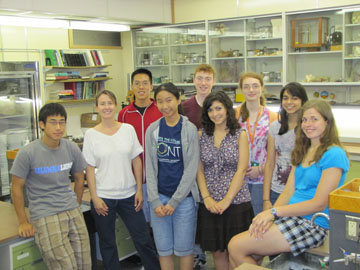|
|
2010 Team 8
|
DEBUNKING THE ENEMY RELEASE HYPOTHESIS: DOES INTRODUCED NORWAY MAPLE LACK DEFENSES AGAINST NATIVE HERBIVORES?
Tony Chen, Julianna Garreffa, Emily Gleason, Joe Miciak, Alomi Parikh, David Shang, Rebecca Shi
Advisor: Dr. Kristi MacDonald-Byers
Assistant: Jess Reid
|
ABSTRACT
Norway maple (Acer platanoides) is an invasive plant species, which originated in Europe, and has become prominent in forests of eastern North America . The enemy release hypothesis (ERH) suggests that invasive species are successful because they have no natural predators in their new location. Our hypothesis was that if ERH is a factor explaining Norway maple success as an invader, there would be less damage from insect herbivores on Norway maple leaves than on leaves of two native species, American beech ( Fagus grandifolia ) and sugar maple ( Acer saccharum) . The study was conducted in the Drew Forest Preserve in Madison , New Jersey . Leaves from the three species of trees were sampled in the Preserve. Leaves were collected from sapling and mature trees so that the effect of age could be determined. Thus, we had six species-age categories. Norway maple had greater area of damage from herbivores but lower percent damage than the native species. The lower percent damage was limited to the sapling Norway maples. These findings do not support the enemy release hypothesis as an explanation for Norway maple invasion in eastern forests. However, the low percentage of area damage in Norway maple saplings indicates that this introduced species may be invasive because it possesses a competitive edge over native trees. The advantage of larger leaves in sapling Norway maple may mitigate the effects of higher insect herbivory in that the potential to gather energy through photosynthesis is not as affected by loss of leaf area as it is in native species. It is possible that Norway maple have not developed defenses to native herbivores because they did not coevolve.
|
| |
|

Team 8 |
| |
| |
|
|


